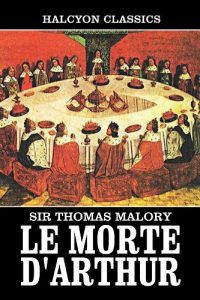
 Literature Guides
Literature Guides
Le Morte d’Arthur Quotations and Analysis
Quotations and Analysis
“Whoso pulleth out this sword of this stone and anvil, is rightwise king born of all England.”
Obviously the prophecy which foretells the coming of Arthur as the rightful king. The quotations encapsulates the theme of fate which pervades the story. It also demonstrates some of the pre-Christian, pagan dimensions retained in Mallory’s re-telling of the Arthurian cycle.
“Now I have warned thee of thy vain glory and of thy pride, that thou hast many times erred against thy Maker. Beware of everlasting pain, for of all earthly knights I have most pity of thee, for I know well thou hast not thy peer on any earthy sinful man.” (713)
Spoken by recluse to Launcelot, these lines speak to the spiritual failing which prevent Launcelot from finding the Sangreal. This also marks a clear shift in the text to the Christian themes Mallory sought to emphasize. Launcelot cannot understand why he cannot attain the greatest object of the quest. He sees himself as the finest of all of Arthur’s knights. It is precisely this pride which prevents him from finding the Sangreal.
“I have done to you no treason, for love is free for all men, and though I have loved your lady, she is my lady as well as yours; howbeit I have wrong if any wrong be, for ye rejoice her, and have your desire of her, and so had I never nor never am like to have, and yet shall I love her to the uttermost days of my life as well as ye.” (604)
Here Sir Palomides addresses Tristram on his love for Isoud. He explains that though Tristram sees Isoud as his maiden, Palomides does nothing wrong by loving her also because love is beyond the capacity of any one person. These lines speak to the overwhelming force that love plays in the story. We see numerous instances in which it is love which drives honorable men and women to do dishonorable things. Love is too powerful to control and outstrips even the most honest and virtuous knights.
“Yet some men say in many parts of England that King Arthur is not dead, but had by the will of our Lord Jesus into another place; and men say that he shall come again, and he shall win the holy cross. I will not say it shall be so, but rather I will say: here in this world he changed his life.” (926)
These final words come from the narrator after the death of Arthur on Salisbury Plain. They foretell the coming of Arthur at some future time. It is with these that Mallory unites his text with the Christian ideals that defined England at the time, and simultaneously create a unique epic romance for England.



